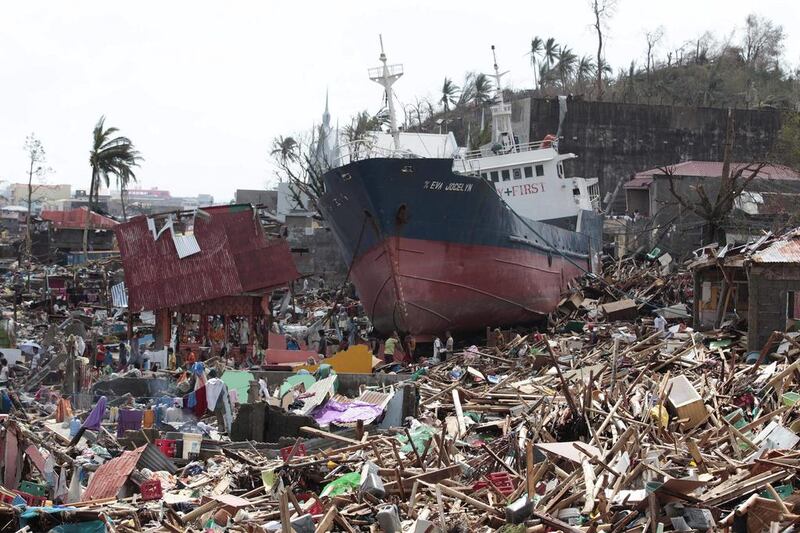TACLOBAN, PHILIPPINES // On the main road to Tacloban bodies were strewn across the streets, corpses were hanging from trees and the smell of death lingered in the air.
Stunned survivors rummaged through debris looking for food as traffic queues of desperate relatives searching for loved ones formed on the edge of the city where more than 10,000 people may have perished.
Inside the city, hunger and chaos had taken over.
Gangs of looters on mopeds sped through the streets trying to hoard what they could.
“We are supposed to keep the peace and order but it’s very hard to stop all the people coming in and looting. They are hungry,” a police inspector said as looters buzzed down the streets from his police station.
Most of his colleagues had left their posts to take care of their families.
Almost every building in the city of 220,000 appeared to have been damaged. Wrecked cars filled the streets, power lines were toppled and trees were snapped in two.
Survivors queued in lines, waiting for handouts of rice and water. Some sat and stared, covering their faces with rags to keep out the smell of rotting flesh.
One woman, eight months pregnant, described how her 11 family members vanished in the storm, including two daughters. “I can’t think right now,” she said. “I am overwhelmed.”
At the airport, people waited in mud and water after trekking three hours by foot from Tacloban City, hoping to be evacuated by military aircraft.
On the outskirts of Tacloban, Edward Gualberto accidentally stepped on bodies as he looted among the wreckage of a home.
Wearing nothing but a pair of red basketball trousers, the father of four and village councillor apologised for his shabby appearance and for stealing from the dead.
“I am a decent person. But if you have not eaten in three days, you do shameful things to survive,” Mr Gualberto said as he dug canned food from the debris and flies swarmed over the bodies.
“This typhoon has stripped us of our dignity … but I still have my family and I am thankful for that.”
Elsewhere in Tacloban, survivors were employing more aggressive means as they took advantage of a security vacuum.
Many had not eaten since the typhoon and overwhelmed authorities admitted they were unable to get enough relief supplies into the city.
Some broke through shops by hammering through windows and winching open steel barricades.
One desperate meat-shop owner brandished a handgun in a failed bid to prevent one mob from entering his shop.
Nearby, a pastry shop owner, Emma Bermejo, described the widespread looting as anarchy.
“There is no security personnel, relief goods are too slow to arrive. People are dirty, hungry and thirsty. A few more days and they will begin to kill each other,” she said.
Richard Gordon, the Philippine Red Cross chairman, described some of the looters as mobsters, after one of his organisation’s convoys was ransacked near Tacloban.
Among the many people trying to get into the city to look for his wife and child was Miler, who had made a 20-hour drive from Manila, where he is a trainee seaman. His car was laden with food supplies and medicine.
“The last time I spoke to her was on Friday and she was worried about the winds. The worst thing was I was preoccupied with my studies. Now I haven’t heard from them since the typhoon,” he said.
Elsewhere supplies in nearby towns are running low. Petrol stations are closing as they run out of fuel.
Along the road to Tacloban families had built temporary shelters along the sides of the road where they sleep and wait for aid to arrive.
On the edge of the city looters rode away on mopeds balanced with cardboard boxes full of shampoo, instant noodles and tubs of mayonnaise. Two men stopped on a bridge to boast about how they managed to steal a year’s supply of toothpaste.
In the river below the bridge, one body washed up on shore in between debris and a dead dog. Men on the bridge pointed out another dead body floating past.
foreign.desk@thenational.ae
* With additional reporting by Agence France-Presse and Reuters





